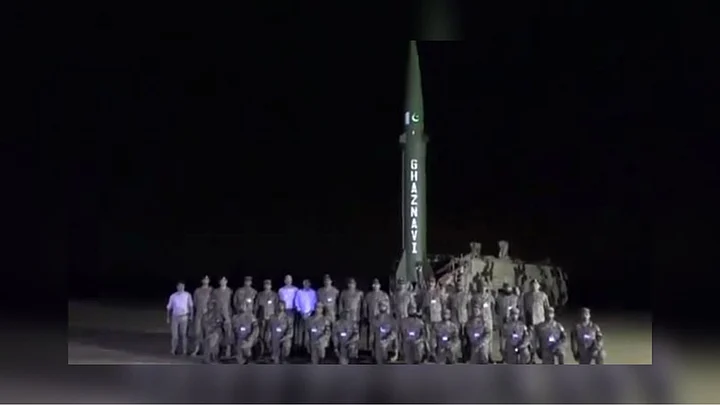Pakistan has successfully test-fired surface-to-surface ballistic missile 'Ghaznavi', on Thursday, 29 August, capable of delivering multiple warheads up to 290 kms, the Indian Army said on Thursday, amid fresh Indo-Pak tensions after India stripped Jammu and Kashmir of its special status.
Pakistan on Thursday closed three aviation routes of Karachi airspace till 31 August, which had promoted speculation about the possible missile testing.
The military's media spokesperson, Major General Asif Ghafoor shared a video of the night-training launch of the short range ballistic missile on Twitter.
He said that the Chairman Joint Chiefs of Staff Committee (CJCSC) and the three services chiefs congratulated the team of experts for successfully testing the missile.
President Arif Alvi and Prime Minister Imran Khan also conveyed their appreciation to the team, and congratulated the nation on the feat, he said.
In May, the Pakistan Army conducted a successful training launch of the Shaheen-II surface-to-surface ballistic missile.
The Shaheen-II missile is capable of carrying both conventional and nuclear warheads upto a range of 1,500 km.
Prior to that in March, the Pakistan Air Force (PAF) successfully test-fired an indigenously developed extended range "smart weapon" from the JF-17 multi-role fighter aircraft.
In January, Pakistan conducted a training launch of a new surface-to-surface ballistic missile named Nasr.
According to the ISPR, the missile would enhance the operational efficiency of army strategic forces command besides re-validating the desired technical parameters.
Missile Launched to Internationalise Kashmir Issue
The missile was launched amid Pakistan's efforts to internationalise the Kashmir issue after India abrogated provisions of Article 370 of the Constitution to withdraw Jammu and Kashmir's special status and bifurcated it into two Union Territories.
Pakistan expelled the Indian High Commissioner after it downgraded the diplomatic ties with India in protest to India’s decision to end Jammu and Kashmir’s special status.
Pakistan also suspended its trade with India and stopped the train and bus services.
India has categorically told the international community that the scrapping of Article 370 was an internal matter and also advised Pakistan to accept the reality.
(With inputs from PTI and IANS)
(At The Quint, we question everything. Play an active role in shaping our journalism by becoming a member today.)
